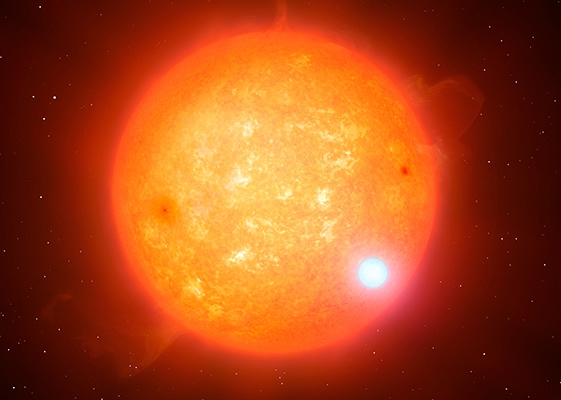A team of scientists will observe 77,000 binary stars with the 4MOST telescope

The aim of the instrument is to advance the knowledge of a wide variety of still open scientific problems in modern astronomy.
A project co-led by the IEEC researcher at the Universitat Politècnica de Catalunya (UPC) Alberto Rebassa has been selected to observe 77,000 binary stars with 4MOST.
A project co-led by Dr Alberto Rebassa, researcher at the Universitat Politècnica de Catalunya · Barcelona Tech (UPC) and member of the Institute of Space Studies of Catalonia (IEEC — Institut d’Estudis Espacials de Catalunya), has been awarded observation time to study 77,000 binary stars with the 4MOST instrument (4-Meter Multi-Object Spectroscopic Telescope) from the European Southern Observatory (ESO). The aim of the 4MOST telescope is to observe more than 20 million celestial objects in the southern hemisphere. Dr Odette Toloza, from the Federico Santa María Technical University (Chile), is also co-principal investigator of the project.
A binary star is a stellar system formed by two stars. In the case of Rebassa’s project, these binaries are composed of a main sequence-type star — such as the Sun — and a white dwarf-type star. A white dwarf is the most common archetype of a stellar remnant, that is, what is left in the final phase of star life. Currently, however, only a few thousand spectra of this type of binary are available.

Image of the 4.1 meter VISTA telescope in Cerro Paranal, Chile, where the 4MOST instrument will be installed (G. Hüdepohl,
atacamaphoto.com/ESO).
With the observations carried out with 4MOST, the team co-led by Rebassa, made up of 30 researchers from 18 institutions around the world, will study a whole series of scientific unknowns, such as the evolution of compact binary stars, the progenitors of thermonuclear supernovae, the age-metallic relationship of the Milky Way — a key observation tool for understanding how our galaxy formed and how it has evolved chemically over time — or the physical and magnetic properties of stars of the same type as the Sun.
Rebassa is a lecturer at the UPC’s Castelldefels School of Telecommunications and Aerospace Engineering (EETAC) and is part of the Astronomy and Astrophysics Group.
The 4MOST telescope
The 4MOST is a second-generation instrument that will be installed in the VISTA telescope (Visible and Infrared Survey Telescope for Astronomy) of ESO, located in the Paranal Observatory (in the Atacama Desert, northern Chile). The new instrument will provide VISTA with the ability to perform large spectroscopic studies, capturing spectra in virtually the entire visible range of 2,400 objects simultaneously, over an area of the sky equivalent to 20 full moons. According to the team behind the design and construction of 4MOST, the instrument will provide the scientific community with a worldwide optical spectroscopy mapping facility that will make a significant contribution to many areas of science.
It is expected that 4MOST will begin operations in early 2024 and the project is expected to last at least 5 years. 70% of the time of future 4MOST observations will be devoted to a total of 10 large-scale projects — called Consortium Surveys — in which millions of stars will be observed in order to better understand the formation and evolution of the Milky Way. The remaining 30% of the observation time will be devoted to a dozen smaller but highly ambitious projects. One of these projects, called Participant Surveys and which has been carefully selected to carry out its observations with 4MOST, is precisely the one led by researchers Rebassa and Toloza.
Press release made in collaboration with the Communication Office of the Universitat Politècnica de Catalunya · Barcelona Tech (UPC).
Main Image
Binary System
Caption: Artist's rendering of the eclipsing binary system composed of a cool subdwarf (in yellow, the large star, one-fifth the size of the Sun) and the white dwarf (in white and much smaller in size).
Credits: Mark Garlick.
Links
More information
The Institute of Space Studies of Catalonia (IEEC — Institut d’Estudis Espacials de Catalunya) promotes and coordinates space research and technology development in Catalonia for the benefit of society. IEEC fosters collaborations both locally and worldwide and is an efficient agent of knowledge, innovation and technology transfer. As a result of 25 years of high-quality research, done in collaboration with major international organisations, IEEC ranks among the best international research centers, focusing on areas such as: astrophysics, cosmology, planetary science, and Earth Observation. IEEC’s engineering division develops instrumentation for ground- and space-based projects, and has extensive experience in working with private or public organisations from the aerospace and other innovation sectors.
IEEC is a private non-profit foundation, governed by a Board of Trustees composed of Generalitat de Catalunya and four other institutions that each have a research unit, which together constitute the core of IEEC R&D activity: the Universitat de Barcelona (UB) with the research unit ICCUB — Institute of Cosmos Sciences; the Universitat Autònoma de Barcelona (UAB) with the research unit CERES — Center of Space Studies and Research; the Universitat Politècnica de Catalunya · BarcelonaTech (UPC) with the research unit CTE — Research Group in Space Sciences and Technologies; the Spanish Research Council (CSIC) with the research unit ICE — Institute of Space Sciences. IEEC is a CERCA (Centres de Recerca de Catalunya) center.
Contacts
IEEC Communication Office
Barcelona, Spain
Ana Montaner and Rosa Rodríguez
E-mail: comunicacio@ieec.cat
Lead Researcher at IEEC
Castelldefels, Spain
Alberto Rebassa Mansergas
Universitat Politècnica de Catalunya · BarcelonaTech (UPC)
Institute of Space Studies of Catalonia (IEEC)
E-mail: rebassa@ieec.cat, alberto.rebassa@upc.edu
